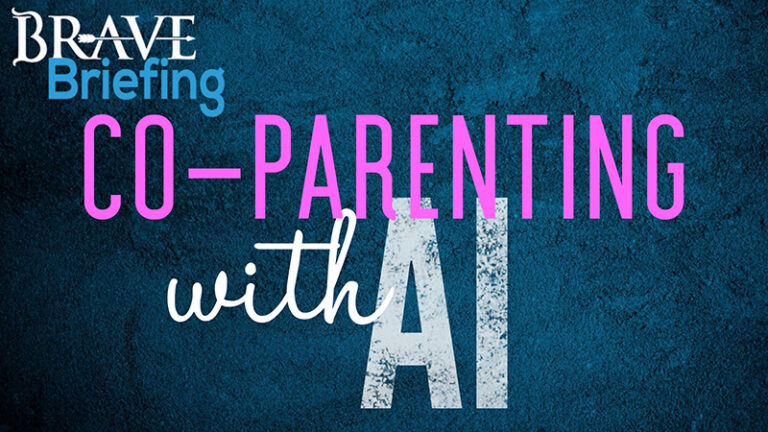There is no denying that modern technologies make life more convenient for parents. Apps allow parents to buy with next-day delivery, schedule a doctor’s appointment, and order groceries.
But let’s be real: convenient parenting does not always mean better parenting. The convenience of iPads (and your smartphone) has led to their use as pacifiers and babysitters. For this reason alone, it’s time to give deep consideration to the conveniences we embrace.
The Common Sense Media report 2025 Consensus Media Use by Kids Zero to Eight found that 66 percent of parents use screens to occupy their child so they can get things done or take time for themselves.
In the short term, this feels like an easy win – a parenting hack Boomers only wish they had. Over time, however, the screen is used for increasingly more learning, exploration, connection, relaxation, and creativity. Whether you intended to or not, you stepped barefoot on the slippery slope and started sliding.
This is why the 2025 Consensus found that 40% of children own iPads by age 2.
By age 4, ownership jumps to 58%.
Why is this a Problem?
We can try to discern whether this ‘iPad kid’ trend is a problem in several ways.
Ostensibly, we could simply recognize that the iPad displaces other traditionally good and healthy parts of childhood. Instead of heading out in the neighborhood to play, children are inside, wide-eyed, with hands gripped tightly to the silicon case protecting their iPads. Instead of reading a book, they watch one YouTube video after another. Instead of drawing, building, or painting, their fingers tap away inside a game.
Retrospectively, we can look at the early childhoods of Gen Z, who, although they bore the brunt of the greatest social experiment of all time, did not have iPads as constant companions during their first five years. The current state of this generation of young adults is unfairly bleak. Many (or most) report they are unhappy, anxious, depressed, lonely, and are not working or going to school.
In humility, we might even admit that our selfish desire for peace and quiet is the motivation (and simultaneously, the apathy) behind why the iPad dominates our child’s life.
The reality is that every parent who hands over an iPad hopes that the iPad will do what they cannot – or will not do.
Parents hope and expect that their child will learn something new, witness positivity, feel connected to others, discover or explore a new interest, and gain exposure to different people and cultures. These are the reasons, as reported by the 2025 Consensus, that parents were “excited about screen media as a tool.”
All of these activities, however, can – and should – be done with the parent in the context of their relationship in real life. Children can learn new things when parents teach them, they can witness positive character in the everyday context of life when parents point it out, and they can connect with others through the parents’ connections. In this way, all that is learned, witnessed, explored, and connected to have an embedded moral framework that helps shape the child’s values, character, and worldview as they engage the world.
To hold an excited expectation that the iPad will accomplish these great enrichments generally means that parents don’t want to do them themselves, or parents believe that the iPad will do them better.
Either way – this abdication and/or outsourcing of responsibility is the core problem.
The Development Problem
Let’s revisit the slippery slope. If parents have excited expectations about their child’s engagement with screen media, they will naturally allow more screen time so that their child is enriched in such ways.
The 2025 Consensus reported that the average daily time children 0-8 years old spend in screen media is 2 hours and 27 minutes.
Is 2:27 minutes (on average) every day considered excessive? What defines “excessive” varies widely, but if we go to what has been the gold standard, the American Academy of Pediatrics recommends no more than 2 hours a day of screen media. By their measurements alone, parents are allowing an excessive amount of time.
This is critical because excessive screen use in early childhood is linked to delayed language development, attention deficits, emotional dysregulation, and weakened social skills.
More screen time inevitably means less real-life connection, which means fewer social skills are learned. Extended screen time equates with less time for independent and imaginative play, less reading, and even less boredom. All of these are essential to healthy childhood development – none of them are accomplished the same way on a screen.
The only thing that develops with excessive screen time is dependency and dopamine overload – and this is a problem.
The Discipleship Problem
It’s one thing to believe that screen media on an iPad can do your job better than you. It’s another thing when you just don’t want to do the arduous job of parenting.
Now, obviously, parents aren’t wholly neglecting their responsibility to care for their children. The kids have all of their basic needs met (and, likely, then some). The “job” that most parents don’t desire to do is the spiritual, moral, and intellectual foundation-building. This is what requires a full-time, always-available, always-ready-to-talk, listen, and teach – level of engagement.
It’s what Scripture defines as discipleship.
God says through Moses: “These commandments that I give you today are to be on your hearts. Impress them on your children. Talk about them when you sit at home and when you walk along the road, when you lie down and when you get up.Tie them as symbols on your hands and bind them on your foreheads.Write them on the doorframes of your houses and on your gates.” (Deut 6:6-7)
Basically, talk about God’s love and His commands all day long and in every way possible. Not just on Sundays. Not through a private school education. Not just praying before dinner. Not through a Bible-based video game. Impress them….talk about them….to YOUR children.
Paul wrote to the Ephesians: “Children, obey your parents in the Lord, for this is right. “Honor your father and mother”—which is the first commandment with a promise— “so that it may go well with you and that you may enjoy long life on the earth.” Fathers, do not exasperate your children; instead, bring them up in the training and instruction of the Lord.”
Those ancient commands from the Old Testament? Yep, those still apply.
Being redeemed in Christ and eager to spread the gospel to all nations doesn’t negate your responsibility to disciple your own children. In fact, salvation in Jesus is the very thing that should compel parents to respond in obedience to disciple their children.
But, we live in the 21st century of immediacy and gluttony. And, not to mention… kids are hard.
While that may be true, it is simultaneously true that when children spend more time on a screen than with their parents, discipleship diminishes even further. Children receive training and instruction from the world. And the online world is a terrible disciple-maker.
Streaming videos and online games frequently promote values and worldviews that contradict Scripture. Worse still, the design of algorithm-driven content is for maximum engagement. Children are exposed to subtle yet persistent influences shaping their hearts and worldviews.
The Inevitable Result
The research done over the last two decades on personal devices reveals that excessive screen time in younger and younger ages has tragic results.
Parents don’t just end up with kids who are occupied so they can get things done, but with children who are obsessed with screens, resistant to boundaries, and detached from the very relationships God created them for.
And we see it all around us. When kids cry and throw a fit, they get the iPad. When they pester and annoy their parents, they get their parent’s phone. But what is most concerning is not what is seen in their outward behavior but what is happening in their heart. Children are growing up without consistent discipleship. Their hearts quietly learn to worship, love, and desire everything in the world. Not because they consciously decided against Jesus but because their parents offered them the world instead.
This is not just a developmental problem. It is a full-blown discipleship crisis.
And it is not someone else’s problem. It is every parent’s problem.
So, now what?
Redeeming the Problem
It’s a sobering splash in the face when parents realize how easily they slid into iPad parenting. Sometimes, the mere thought of reigning it back in brings about anxiety and fear. It feels almost too impossible to even try.
This is precisely why Christ died for us. He came to “proclaim freedom for the captives and release from darkness for the prisoners” (Isaiah 61:1). To those who believe and call upon His name, He sends His Holy Spirit to live within us. It is through the power of the Holy Spirit – not on your strength, Mom or Dad – that your child can experience freedom from the iPad.
Consider what Paul wrote to the Ephesians:
“For we are His workmanship, created in Christ Jesus for good works, which God prepared in advance for us to do.”
God has called you, equipped you, and entrusted you with children who need the knowledge and instruction of the Lord. He prepared this work for you in advance and is sovereign over the time and place in which you are to do it. He is faithful to help through it!
There is no shame or blame for what you didn’t know, understand, or do yesterday. You cannot undo what has been allowed, but you can trust that “He who began a good work in you will carry it on to completion until the day of Christ Jesus” (Phil 1:6), and that “in all things God works for the good of those who love him, who have been called according to his purpose” (Rom 8:28).

While you believe on those truths, you can work out your sanctification:
1. Repent.
Confessing your error in allowing the iPad to pacify and instruct is the best way to model the most powerful truths of the gospel: that Christ redeems our failures and transgressions and makes all things new!
2. Create a media standard and game plan for weaning off screens.
A media standard is essential for moving forward. You must establish clear and consistent expectations for the use of screen media. If you need help establishing this, consider the Managing Media Creating Character Study Guide and Workbook.
Depending on the amount of screen time previously allowed and the type of content consumed, some children will need to be weaned from the screen. Going “cold turkey” also works, but if you opt for this method, be sure to explain your decision with honesty and repentance first. Kids will need context to understand why their first love has left them.
3. Choose presence over pacification.
After repentance and resetting the standard, the real work of re-engaging begins. Sit with your children, listen to them, read aloud, invite them into your tasks, welcome their interruptions, and delight in their presence.
4. Remember to bring alternatives.
Before you head to the store, restaurant, or to run errands, consider what your child may want to play with or do in the moments where they don’t have your attention. This may be a sticker book, a mini dry-erase board with dry erase marker (a personal favorite), coloring book and crayons, or a small toy.
Be Brave
Big Tech boasts that “there is an app for that.” And while there are countless apps that aid your parenting, there is no app that can replace you. Outsourcing parenting duties and responsibilities makes for an easy now but hard later scenario. Convenience is not the goal – discipleship is about growing in Christlikeness.
Be brave and make the choice to give them a play-based childhood over a screen-based childhood. They won’t choose this themselves; you must choose this for them.
The fruit of your choices and discipleship may not be immediate, but it is eternal.

















